
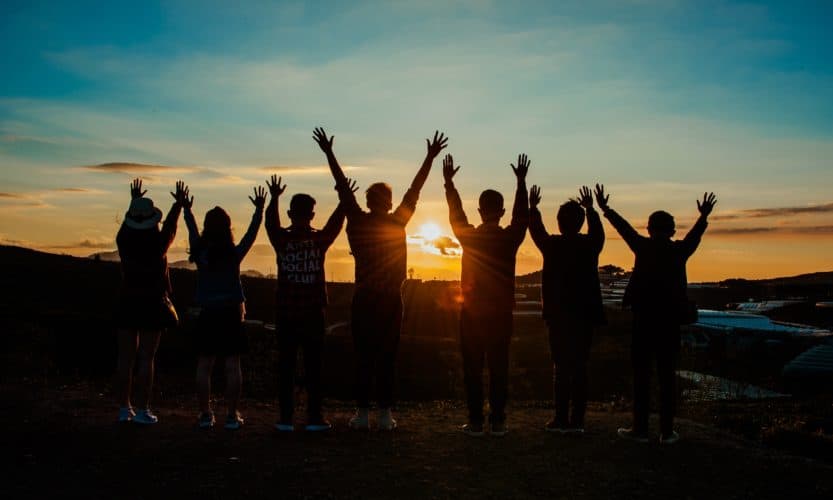
While solo travel often leads to unforgettable experiences (how about sleeping in a temple on top of a cliff?), it can tend to become a bit lonely if you don’t meet people to share the adventure with. It doesn’t have to be, though. This article will give you invaluable insights to help you when making friends as a solo traveller on the road.
As a solo traveller, the type of accommodation you choose can make or break your entire trip. For example, staying in a hotel probably isn’t your best bet if you want to make friends. However, there are three terrific alternatives for you to choose from.
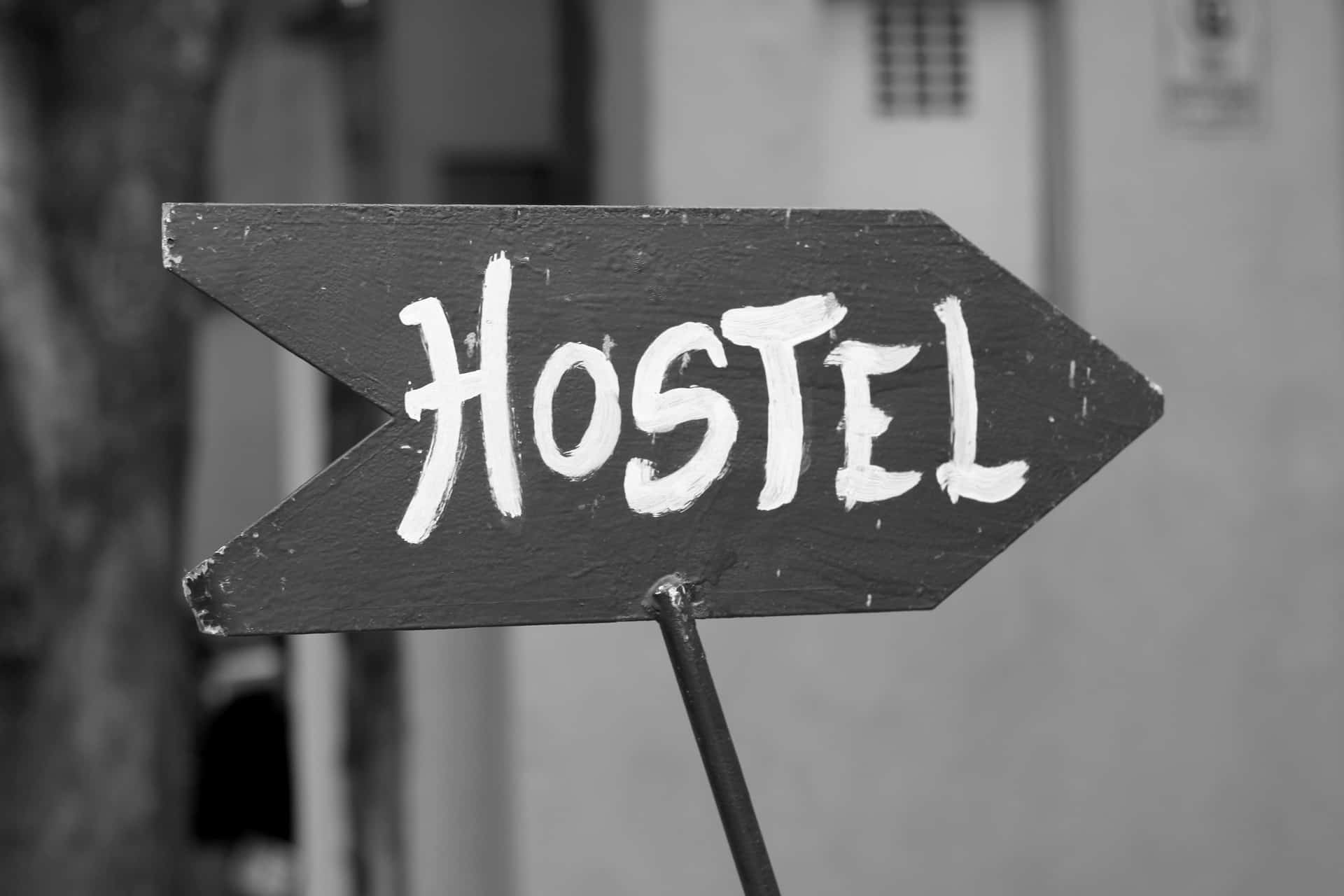
If you haven’t heard of hostels by now, I’m pretty sure you’ve been living under a rock for the last decade. Nowadays, hostels are no longer the unkempt, shady places where people go to be murdered. You can get a bed in a shared dorm room for a fraction of the price of a hotel room.
Especially for solo travellers, hostels are a trendy, social, and – most importantly – cheaper alternative for hotels. They almost always have communal spaces where you can meet like-minded people and are therefore the perfect place for make friends as a solo traveller.
In case you’re not convinced yet, hostels often have a guest kitchen where you can cook your own food and save some money, are generally located around the city centre and the staff are mostly young travel enthusiasts with lots of information about local happenings.
One of the best ways to find hostels online is by browsing hostel websites, such as Hostelworld, Hostels.com and Hostelbooker.

Through Couchsurfing, you essentially get to stay with a local for free. Not only does this mean you get free accommodation, which is usually a considerable chunk of any travel budget, it also means that you get to stay with a person who can tell you all about the culture of the place you’re visiting.
Many people come to Couchsurfing for the free accommodation but stay for the people they end up meeting and because they want to give back to the travel community by hosting their own house or apartment for other surfers.
A widespread concern about surfing with somebody you’ve never met is safety. After all, you’re staying in somebody’s home, exposing yourself to many possible dangers.
However, most Couchsurfing hosts are people who were surfers themselves at some point. They’ll understand what a first-time surfer is going through and will undoubtedly try their best to make you feel comfortable in their home. The website also has several safety checks, such as official ID verification and reviews from fellow surfers.
As long as you use common sense when selecting your host and during your actual CS experience, you should be fine.
Airbnb is one of the most famous websites for short-term property rentals, and it’s very often used among travellers. The most obvious advantage of this website is that you’re usually getting a fully furnished home for a very fair price.
On the subject of price, Airbnb prices tend to be somewhere between a standard bed in a hostel dorm room and a room in a hotel. That being said, it might not be the best choice for solo travellers. However, if you can’t seem to find a good hostel, hotel or CouchSurfing host, you might want to consider looking on this website for accommodation.
You might think that renting an Airbnb as a solo traveller is not very likely to make you any friends, but I’d have to disagree. When I went to Malta, I had to look for an alternative for my CouchSurfing host who bailed on me at the last minute, and I ended up sleeping in Daniel’s home.
He and his girlfriend were renting out rooms and beds in communal areas to travellers from all around the world. Daniel ended up being one of the best parts of my trip because he was able to show me all around and give me cool insider tips.
Food and drinks are one of your main costs as a (solo) traveller, but that doesn’t mean that you can’t have some fun and make friends while eating. On the contrary, it might just be one of the best ways to make friends.
If you’re staying somewhere for longer than a couple of days, becoming a regular at a bar or restaurant might be an option for you to meet new people. The staff will start to recognise you and other local regulars may strike up a conversation with you.
Another risky tactic you could use is to approach another person who is eating alone and saying something along the lines of “Hey, I noticed you were eating alone. Mind if I join you?” This is risky because that person may actually want to eat by themselves and turn down your company.
But hey, it’s worth a shot, right?
There are several apps and websites that aim to connect (solo) travellers with people that can offer an authentic representation of local cuisine. This experience is often called “social dining”. Doing this can be an amazing way to both get a taste (pun intended) of what the food in your destination is actually like and maybe make a local friend.
A few examples of these websites are WithLocals, EatWith (Android / iPhone) and MealSharing. Moreover, you might get lucky and find a local that will cook for you on Couchsurfing or Airbnb.

Whether you just want to play board games and get to know some fellow travellers or you want to indulge in beer and tequila for a memorable night (or, more accurately, a night that is unforgettable but hard to remember), hostel bars are the place to be.
That being said, it’s a good idea to comb through guidebooks and browse the internet to find out what kind of hostel you’ll be staying at. It’ll be way easier to find people to go out with at a party hostel than at a boutique hostel. That’s just another choice you’ll have to make.
Fun fact: in most party hostels, you’ll be able to spend time in the communal areas (e.g. the bar), even if you’re not sleeping there yourself.
Fun conversations over dinner or lunch have a way of forming new friendships between strangers. Whether it’s a bowl of pho in Vietnam or pizza in Italy, chances are that you’ll meet new people over food.
Besides, there are many ways to share food with others. You can share some snacks in a hostel bar with other travellers, you can eat with locals through the aforementioned apps and websites or you can approach someone eating alone at a restaurant. The possibilities are endless.
The most important thing to do when you’re trying to make friends as a solo traveller is to be open-minded and accepting. After all, if you’re not going to accept other personalities, lifestyles and cultures, what’s the point of travelling at all?
On the road, especially as a solo traveller, it’s more important than ever to adopt a tolerant attitude. Not only because you should show respect for the culture you’re visiting, but also because you could miss out on a lot of special friendships from people all around the world.
So, next time somebody approaches you while you’re waiting for the bus or you’re standing in line to visit a museum, don’t just shrug your shoulders. Have a conversation and see where it leads. Who knows? You may just have made a new friend.
Nowadays, having a plan that tells you where to go is essential while travelling. You probably don’t want to be aimlessly wandering around a destination and go back home just to realise you haven’t actually seen anything.
While it’s nice to have a plan to fall back on, this plan shouldn’t be an absolute must, but rather a general guideline with wiggle room. This way, if somebody should invite you to a rooftop barbecue or ask you to go visit a temple together, you don’t have to turn them down.
It’s also good practice not to overplan your holiday. For example, you could leave one day a week without any plans as a buffer for any unexpected things that may have come up.

As Neale Donald Walsch put it so eloquently, life begins at the end of your comfort zone. This quote implies that you need to have the courage to leave your comfort zone in order to really experience life.
You probably wouldn’t even be travelling by yourself if you had stayed in your comfort zone. You’re heading in the right direction. Now, it’s time to take that one step further, especially if you’re an introverted solo traveller.
It’s not easy to put yourself out there and be vulnerable in front of strangers. If it pays off, it’s that much more rewarding, though.
The comfort zone is overrated, anyway.
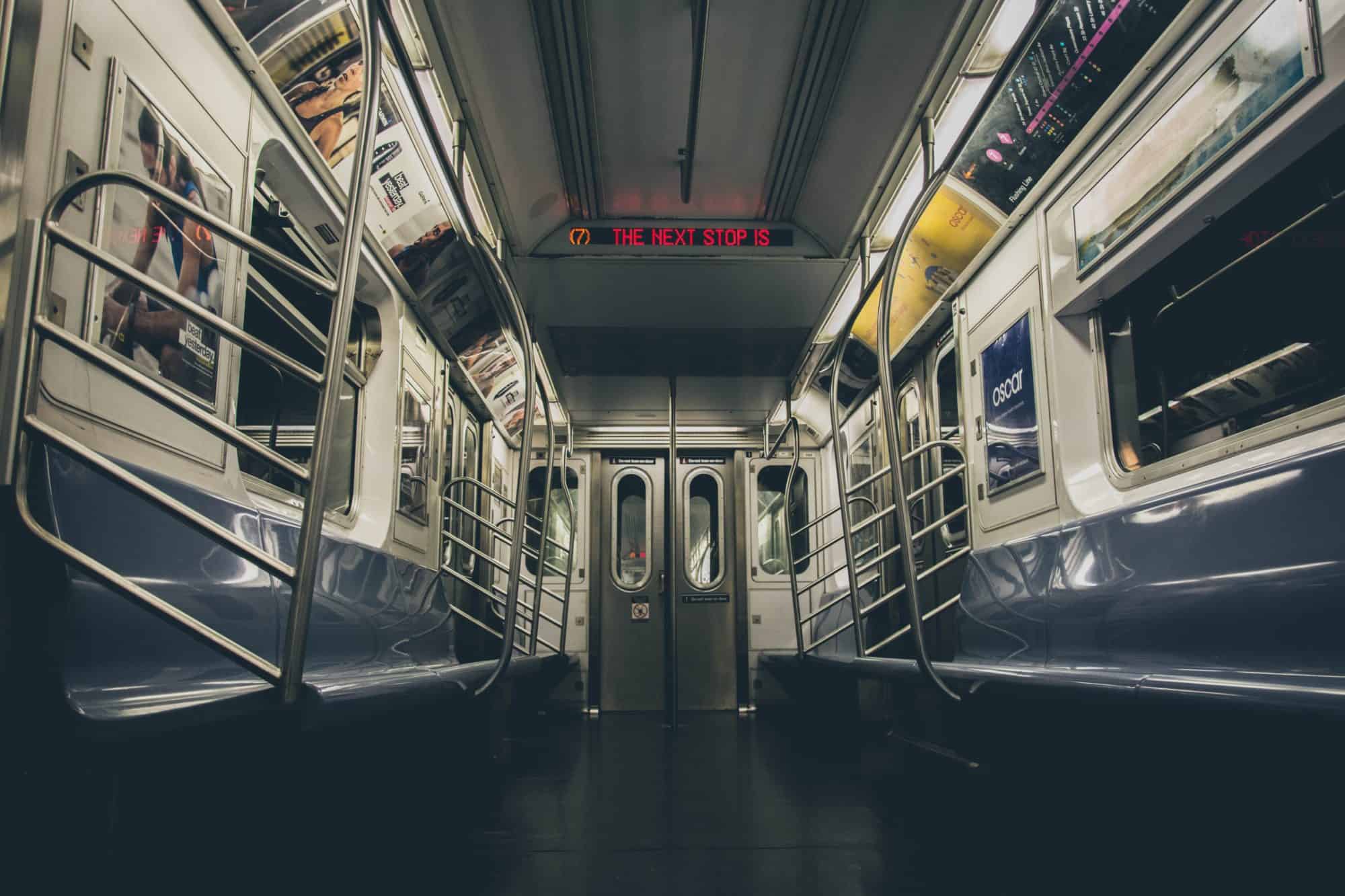
Drinking in hostel bars or having a chat with a stranger on a tour are far from the only ways of making friends abroad, although they might be the most conventional.
You can meet people in transit. During a long train ride between two destinations, on a plane, or even on a short-haul bus ride.
Related: How to survive a long-haul flight
Better yet, you could just end up having a conversation with a traveller who’s heading in the same direction as you, which means you’ve already made a friend before even arriving at your destination.
Anywhere you go, plenty of activities will be organised for travellers like you and locals alike. These activities are the perfect place to meet new, like-minded people, and thus pose the ideal opportunity to shoot your shot.
Making friends as a solo traveller has never been easier.
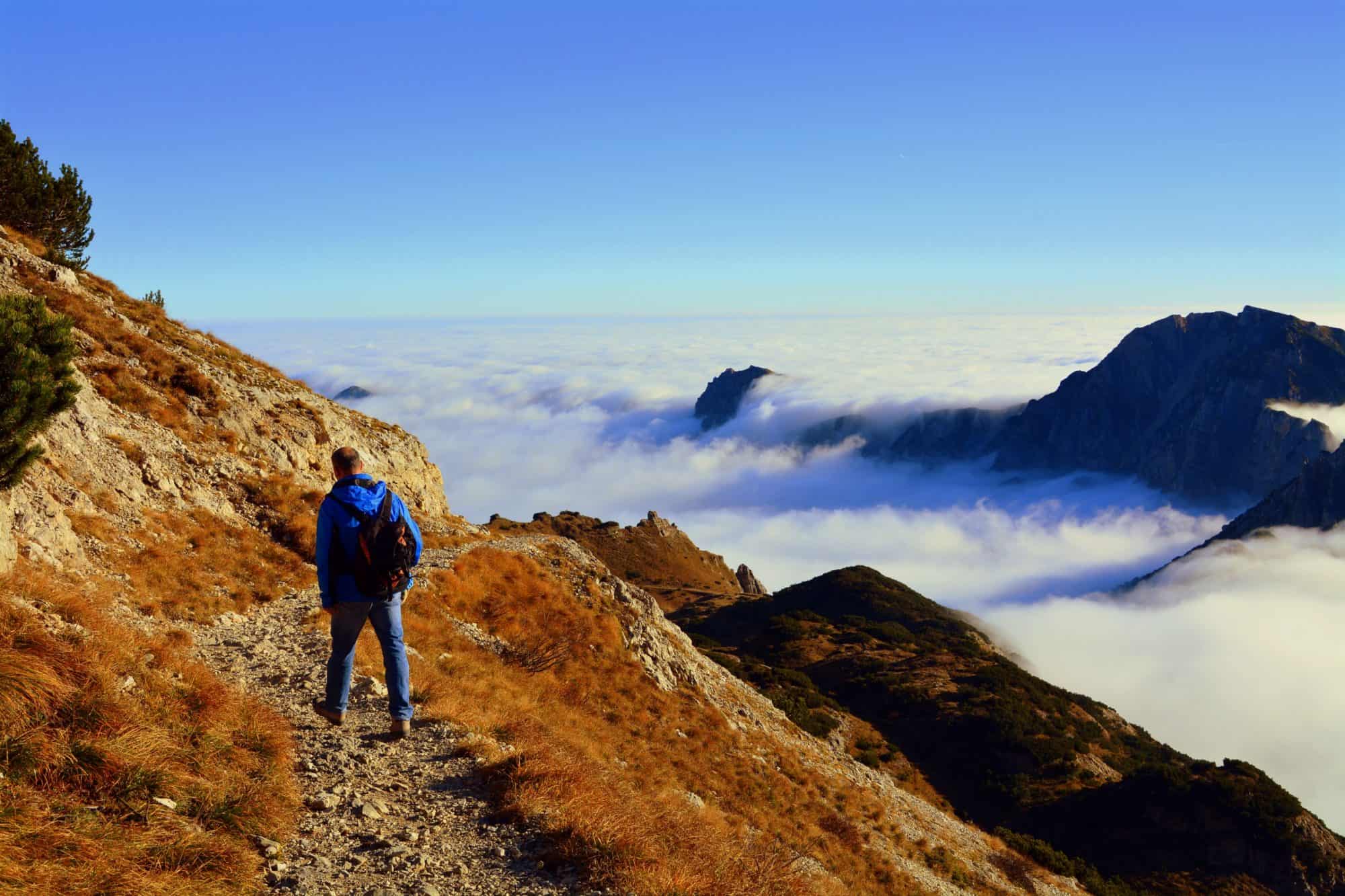
If you’re planning on staying in a hostel during your solo trip, you’re in luck. Not only because it’s incredibly easy to meet new friends, but also because most hostels make an active effort to organise trips and activities for the less extroverted and enthusiastic among their guests. They often have years of experience, so they know what can get people to talk to each other. Joining these activities is a surefire way to make new friends, or at least get to talk to someone.
Another platform that aims to bring its people together is Airbnb. Through their “Experiences” programme, they try to unite locals and travellers so that both can enrich their lives through a unique experience that the destination has to offer. For example, you can play football with locals in Barcelona or attend a traditional tea ceremony in Kyoto.
Additionally, you could just browse through Facebook Events in your destination while you’re visiting.
Related: The best solo travel destinations in Europe
First of all, it’s very likely that you’d only take a class if you’re interested in the subject of the class. As a consequence, it’s also very likely that the other people in the class are interested in its subject.
Quick situation sketch: you’re in a room with a bunch of people, trying to learn something – let’s say you’re learning how to make pasta. In this scenario, it’s impossible for you not to have anything to talk about, because you can always fall back on pasta – the thing you’re learning about – should the conversation not go as planned.
Another plus that you can’t neglect is that you’re learning a new skill. Now, give me one good reason why you shouldn’t take a class.
Admittedly, I’m going out on a limb here.
Imagine you’re on a city trip to Dublin, walking around the city centre when suddenly you see this guy across the street wearing a t-shirt of one of your favourite bands. What do you do?
As a solo traveller, the only right answer is to approach the guy and ask him about it. Best case scenario: you start talking about the band because you’re both massive fans and you become friends. Worst case scenario: the guy looks at you like you’re an alien because he borrowed the t-shirt from someone else and you feel awkward for 30 seconds. Oh well, it was still worth a try, right?
Finding something to share a conversation over doesn’t have to be difficult. It can be something as small as a pin on your luggage, an iPhone case or a sticker on your laptop.

The point I’ve been trying to make in this whole post is that solo travel doesn’t have to be lonely. If there’s one thing that proves that, it’s that you can still go on a group tour.
Obvious advantages include meeting other people and not having to plan everything yourself.
Two fantastic companies that organise group tours (both for solo travellers and for people who are already travelling in a group) are Busabout and TourRadar. Busabout uses a hop-on-hop-off system where you get to choose your own itinerary, giving you the flexibility of solo travel and the convenience of a group tour. TourRadar creates very professional group tours in small groups so that solo travellers and introverts would feel included as well.
We live in the twenty-first century. There’s nothing taboo about meeting people online, whether it be a date on Tinder or another traveller who you can take a tour or have some fun with.
Using an app is a godsend for introverted solo travellers.
Here are some of my favourite solo travel apps to use in 2020.
Backpackr (Android / iPhone) lets you input your date and location and shows you all travellers who are there at that time. An algorithm will decide if your interests match enough and let you message each other to meet up or to travel together. The app will also send you push notifications every time someone new is on their way to your destination.
If you’re looking to date while on the road, you may want to check out TourBar (Android / iPhone). The app is something between Tinder and the aforementioned app. You select someone based on their profile and strike up a conversation if it’s a match.
Tourlina (Android / iPhone) works on the same concept as Backpackr, but it’s the first of its kind to only feature women. New profiles are checked thoroughly and only verified accounts can talk to one another.
Aside from dedicated apps that help you meet a travel companion, there are several other ways to use the internet and social media to your advantage as a solo traveller.
Facebook is one of the big ones. For starters, you can write a post to tell your friends where you’re going. They might know someone there. (You can obviously also do this on other social media, such as Twitter and Instagram).
Secondly, you could check out dedicated Facebook groups of your destination. Nowadays, there’s pretty much a group on Facebook for everything, so chances are you’ll find what you’re looking for.
Moving on from Facebook, you can also find interesting events on Couchsurfing. You can select where and when you’re going and you’ll instantly get a list of activities happening in your area. Who knows? You might end up going to a house party, hiking a mountain or sailing in the middle of the ocean.
The most important lesson to be learnt from solo travel is that your own company is more than enough. Being abroad by yourself really has a way of making you appreciate your own personality and everything you stand for.
Nowadays, too many solo travel tips (including this blog post) focus on meeting new people as a solo traveller. That’s why I think it’s important to add that you don’t have to go out and meet people just because the internet is telling you to.
The whole point of travelling alone is to figure out what you want and who you want to be. That includes deciding whether or not you want to make new friends.
Anyways, I hope you enjoyed reading and learnt something. If you used these tips and met some new people, I’d love to hear about it on Twitter!
If you have any tips to make friends as a solo traveller, feel free to leave a comment down below.
Thanks for reading!
-S

You might think finding cheap food and drinks when you’re travelling is difficult. You might even think it’s unnecessary. What if I told you it’s easier than you might think and it will change the way you travel?
Latest update: 29 November 2018
Note: this post uses insights from my ebook “The Insider’s Guide to Solo Travel on a Budget“, dedicated to helping solo travellers save money on the road.

As such, this post is the third in a miniseries of blog posts about cheap solo travel. I’ve also written two blog posts about how to find cheap accommodation and how to find cheap transport (including flights) as a solo traveller.
You’re not here to watch me babble on about my book, though. You’re here to learn how to find cheap food while travelling. Let’s take a look!
Being a food lover myself, I find it hard to imagine being frugal about food and drinks. Fortunately, you don’t really have to. If you have any brains at all, you’ll know to plan ahead and find ways to save. And that’s exactly what I’m here for.
On average, food and alcohol is the third biggest cost of a holiday. That means that it’s definitely possible to find cheaper alternatives for the more expensive chunks while still enjoying your holiday to the fullest.
In the following article, I’ll share my top 7 ways to find cheap food on the road with you.
Many blogs, websites and Instagram accounts are entirely dedicated to bringing you the best food that a culture has to offer.
Blogs are mostly used to help give you some inspiration as to what you’re going to cook. There are entire blogs about Thai food, Mediterranean food and even Nigerian food. It can be tempting to spend hours of your day looking at blog posts and recipes on these websites.
Of course, there is also an abundance of drool-worthy Instagram accounts that post food pictures and videos. My favourites are @sproutedkitchen, @chefjacqueslamerde, @lilydiamond and @pastrywithjenn. (These accounts don’t only make me jealous of their photography skills, but also of their cooking. Nice.)
Other useful websites are TripAdvisor and Foursquare. Both give you the option to sort nearby restaurants and bars by price, which makes it incredibly easy to pick out the cheapest places to eat and drink in your destination. On Foursquare, you can sort from $ to $$$$ under “Price”; on TripAdvisor, you can choose between “Cheap Eats”, “Mid-range” and “Fine Dining”.
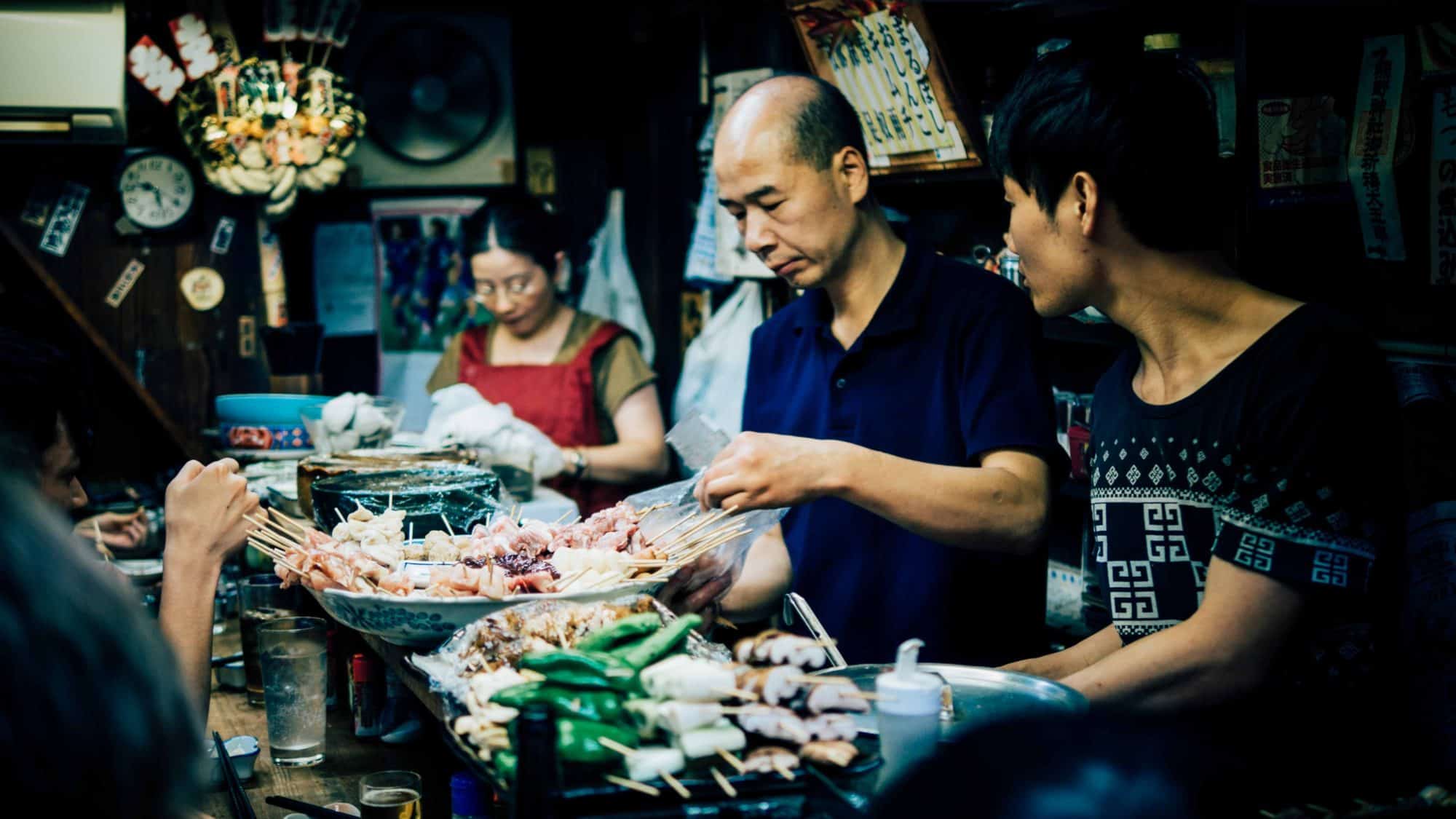
Photo by Lan Pham on Unsplash
For many people, street food is one of the most exciting parts of travelling. To them, a trip abroad isn’t complete without eating street food. You HAVE to eat pastizzi when you’re in Malta, drink boba tea in Taiwan and eat poutine in Canada. You just have to. There’s no getting around it.
For starters, it’s cheap. In many regions of the world – especially in typically cheap regions like Southeast Asia and Latin America, it’s very easy to find a food stall that will serve fresh street food for barely any money.
Secondly, it’s delicious. Enough said.
Thirdly, street food gives you a taste – pun intended – of other cultures. You’re not getting a dumbed-down version of the food like you might get in a hotel, but you’re getting an authentic look into what life is like for the locals. Street food usually presents the best of the local cuisine, as some food trucks and carts can sustain their business for 30-40 years with recipes passing down through generations.
The truth is that there isn’t a real way to consistently and systematically safety-check street food vendors. However, that doesn’t mean that you’ll get sick and die when you get pad thai from a food truck in Thailand.
There are some ways to avoid getting food poisoning from street food.
All in all, street food is a fantastic way to get to know a culture and eat delicious meals for little money. If you keep your wits about you, you should be more than fine.
Being prepared for your solo trip and doing your research really pays off. Going into a new city with no idea what you’re doing and no idea what you should look for is just about the worst way you could start your holiday, and you’ll probably spend more than you want to.
It’s a well-known fact that in most destinations, the prices of restaurants and bars around the city centre and main tourist areas tend to be cranked up quite a lot. If you really want to save money, you’d be well off going to the restaurants and bars that the locals go to. To find those, your best bet is to just ask one of them.
If you don’t have access to any locals for some reason, it’s more than worth it to just wander around little streets and less-known areas in search of some cheap restaurants that serve decent food.
Local food is cheaper than imported food, period. When in Thailand, you’ll find cheaper pho than in America and anyone who wants to eat good mussels for a decent price should be in Belgium. After some quick research, you should be able to find out which foods are common at your destination and adjust accordingly.
Added bonus: eating local foods is more environmentally friendly since it doesn’t have to be flown halfway across the world.
A quick Google search can tell you a lot. Just by searching “Cheap food in [destination], you can find out where the cheap restaurants are, you can locate great food stalls and you may even come across some events that offer cheap food. Now that’s something you’d want to know about, isn’t it?
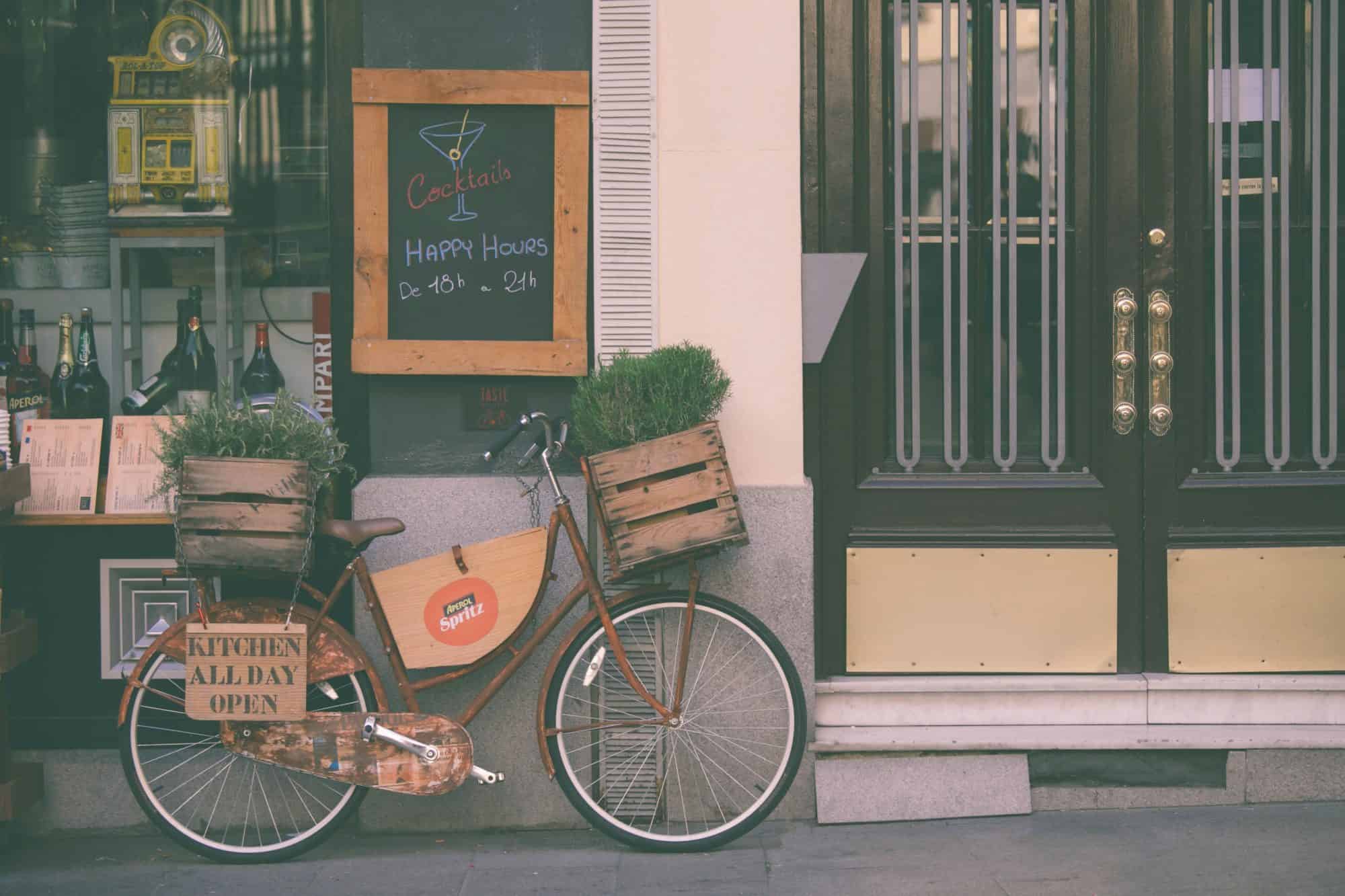
Photo by photo-nic.co.uk nic on Unsplash
In general, I’d actually advise against drinking alcohol when you’re travelling alone. You don’t have to take account of your travel companions, so you can do whatever you want to, but there’s also nobody that can help you when you need it. Getting drunk is one of those times when you might need it.
However, if you want to drink some alcoholic beverages without getting completely wasted, you might want to consider drinking during happy hour.
Just in case you don’t know what happy hour is: it’s a period of time in which a venue (restaurant, café, bar, etc.) offers some kind of discount, mostly on alcoholic drinks. These discounts come in many forms: “buy two, get one free”, “two for one” and free appetizers, among others.
Obviously, there’s not one set international time for happy hour. You’ll have to do some quick research to find out which venues are offering discounts. Locating venues with happy hour is easy enough: apps like Loople can help you with that.

Those bottles of water that you buy add up. Let’s say you buy two bottles of water a day, at $0.75 each. If you’re travelling for one month, that’s $45 worth of bottled water. Is that really worth it?
Of course, it is if the tap water at your destination isn’t safe to drink. After a quick Google search, you should have an idea of where you can and where you can’t drink tap water. This infographic can be a good place to start.
Some other tips to save money on water:
Most travellers have a sandwich or something similar for lunch, and then go out for dinner. Restaurants know this, and they adjust their prices based on it. Now that you know it as well, you can adjust your eating habits.
Usually, restaurants serve the same food at lunch and at dinner, with only one big difference: the price. Seeing as it’s the same food, you’re not compromising quality for a few bucks, but rather saving money by being smart and avoiding the masses.
For an even better chance to find cheap food, be sure to ask your waiter if they have any lunch specials as well.
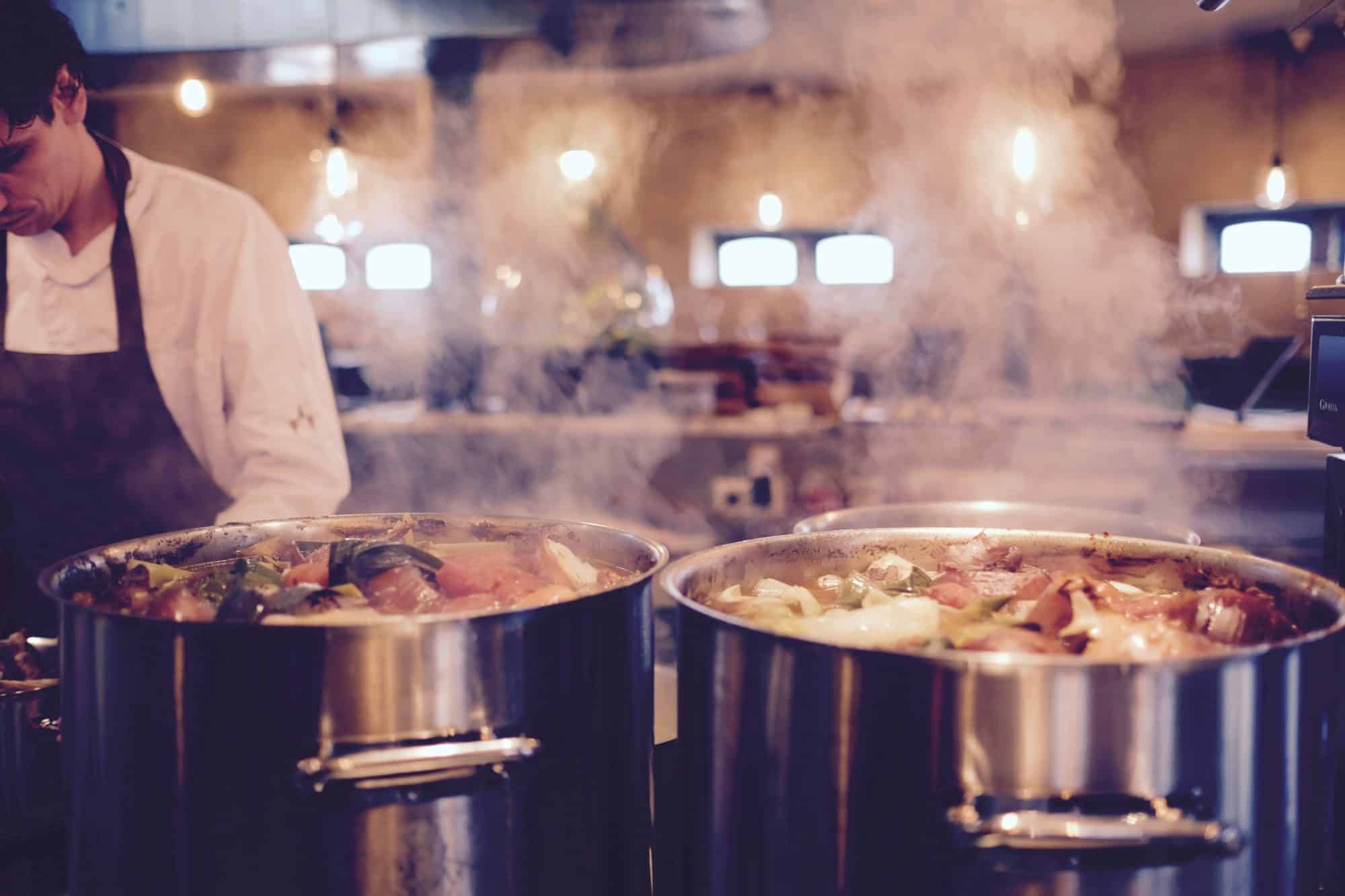
Eating out at restaurants every day during your trip is one of the best ways to burn through your budget. Cooking your own food while travelling can counter this problem. Even at home, cooking is less expensive than eating out. Why shouldn’t it be on a holiday?
Having access to a kitchen at your lodging is obviously essential if you want to cook your own food. Most hostels and Airbnb‘s nowadays have kitchens, and even in some hotels, you can access some kind of kitchen. At the very minimum, you’ll want to look for accommodation with a fridge and a stove or an electric burner.
Although cooking in a hotel room without access to a kitchen is possible, I’d still recommend looking for a place where you can cook without having to lug around a rice cooker.
Make a meal plan for an entire week (if you’re travelling for longer than one week). If you won’t be abroad for longer than a week, plan out the meals of your entire holiday.
By planning out your meals, you spend time thinking about your food and you make healthier and cheaper choices. It also prevents you from having to throw away leftovers you didn’t know you still had, because you know exactly what you’ll be eating and when you’ll be eating it.
Finding cheap food in a supermarket is surprisingly easy. I have some tips to help you:
This post marks the end of the Cheap Solo Travel series. I hope you enjoyed and learned something by reading my blog posts.
If you have any tips to find cheap food and drinks as a solo traveller, be sure to let me know in a comment.
Thanks for reading!
-S
PIN IT!
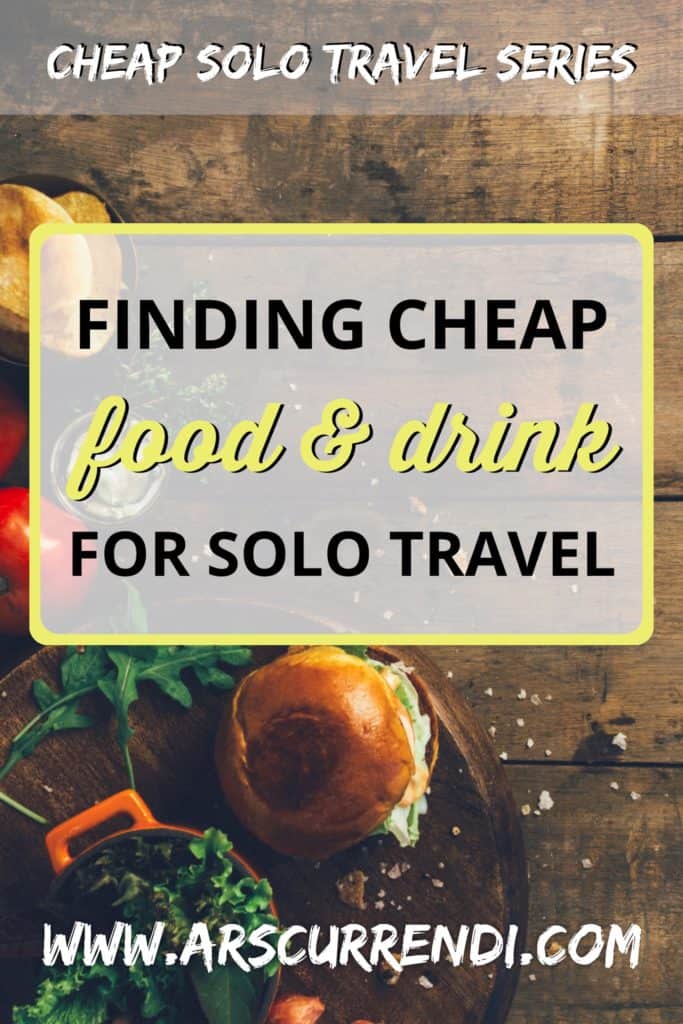

Finding cheap transport while travelling solo can be more challenging than it would be if you were travelling with other people. If you use these tips, however, you’ll be sure to find those cheap flights and other modes of transport you’ve been looking for.
Note: this blog post uses insights from my ebook “The Insider’s Guide to Solo Travel on a Budget“, where I teach everyone how to be a better solo traveller and spend less money on the road.

This blog post is the second in a miniseries of three dedicated to cheap solo travel. You can also learn how to find cheap accommodation or cheap food and drinks while travelling solo. I created this series to help you travel by yourself and spend less while doing so. It uses things I learned myself during my solo trips and tells you things I wish I had known when I started travelling alone.
One of the most expensive parts of many trips is the flight. Everyone that wants to travel has to spend money on transport, but it doesn’t have to be as expensive as you think.
There are many ways in which you can save money on transport, which just means that you get to spend that money on other parts of your trip, like accommodation or food.
The majority of this post will discuss how to find cheap flights because that’s the biggest cost in most cases. It will also include information on how to find cheap buses and trains, and solo alternatives for rental cars (which tend to be very expensive for solo travellers).
Many travel experts have their own tips and tricks for finding cheap flights. Everyone has a favourite flight metasearch engine, and there are so many that finding cheap flights nowadays is really not as difficult as you may think. I’ll help you with it.
I’ll divide these tips into two main categories, both filled with extensive knowledge and subcategories:
You’ve probably already used one (or more) of these flight search websites while looking for a flight. On one page, they conveniently list the results from dozens, if not hundreds, of airline websites. They scour through these websites, looking for the best offers in a matter of seconds.
Nowadays, there are plenty of flight metasearch engines to search from. There are so many that it may be hard to know where you should start. All of these websites have advantages and disadvantages, which is why you shouldn’t perform all of your searches on just one website.
In this section, I’ll give you an overview of my personal favourite flight search websites, along with their (dis)advantages and why I use them. These are listed in bullet points for your convenience, so you can quickly scan through them.
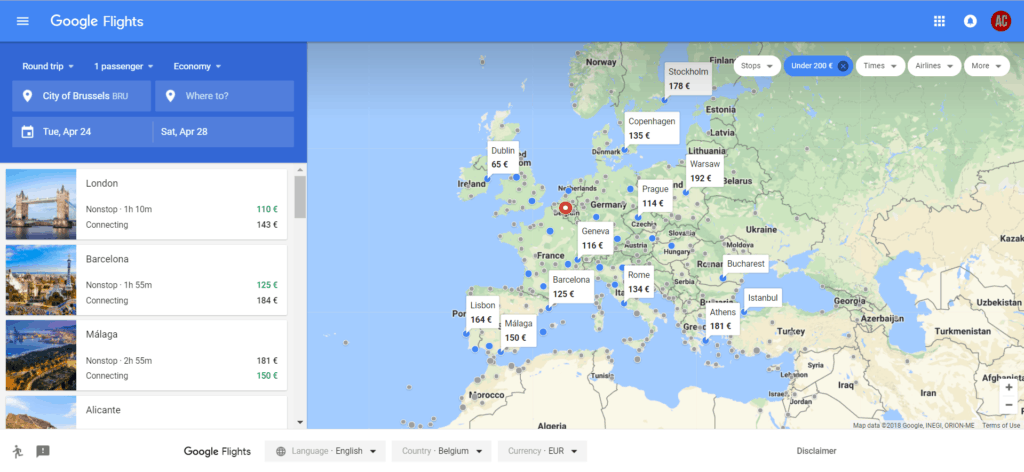
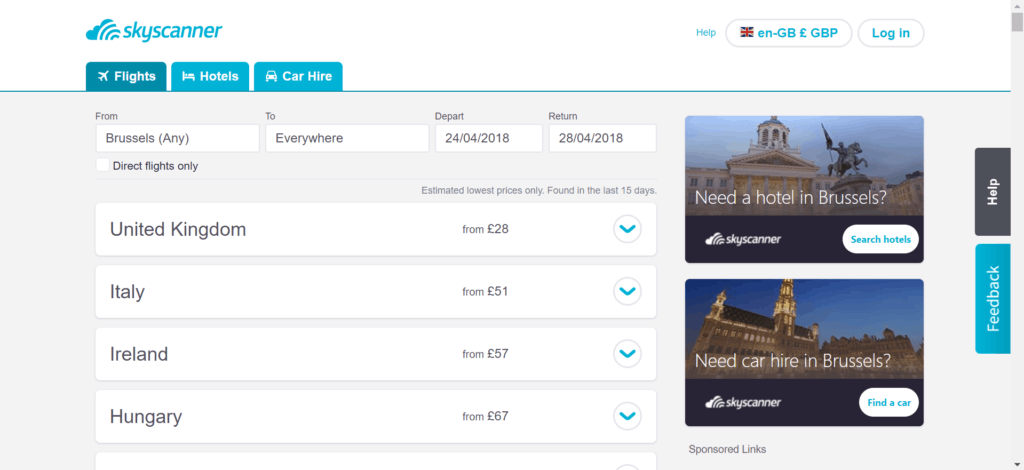
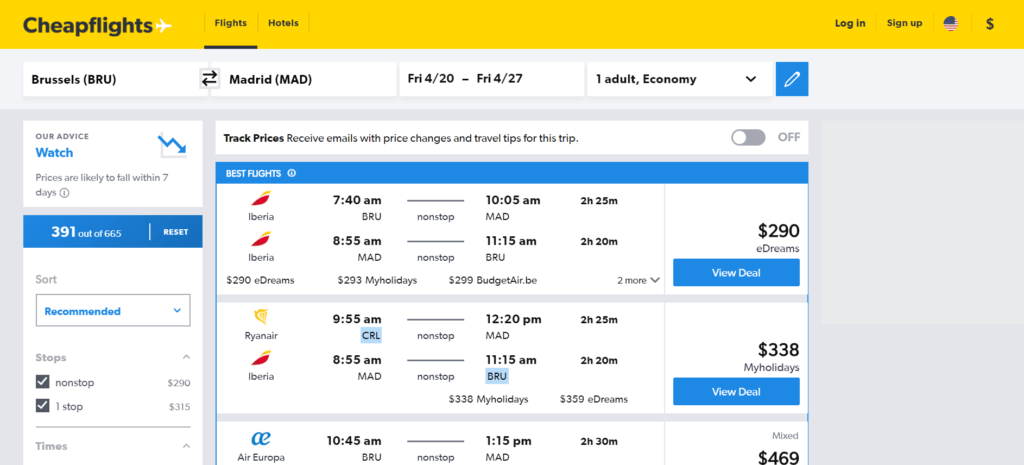
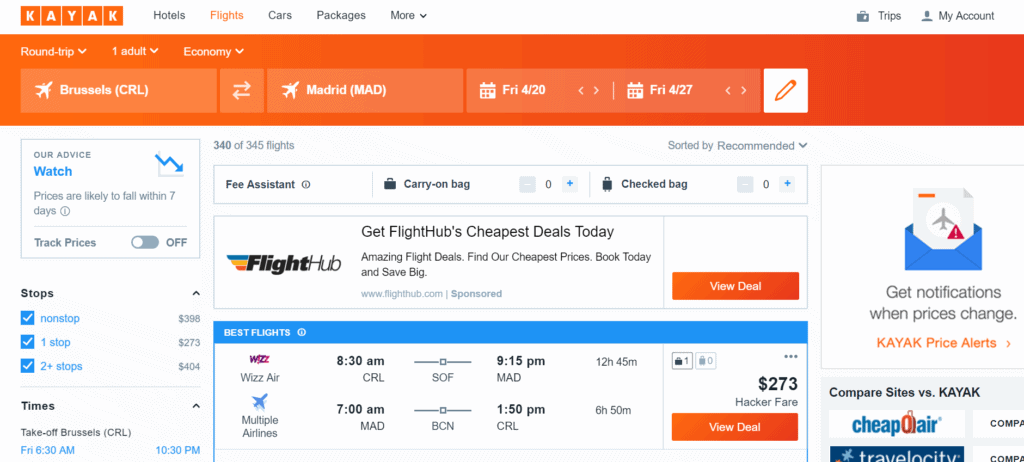
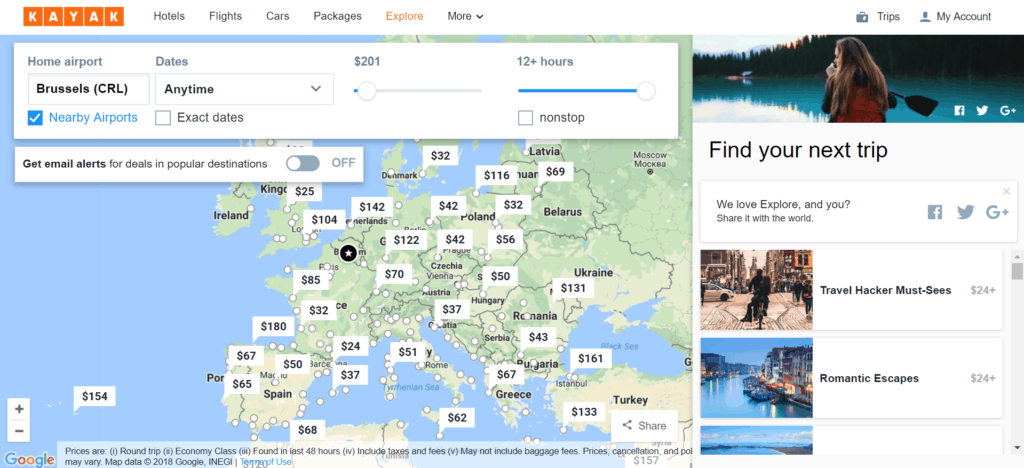
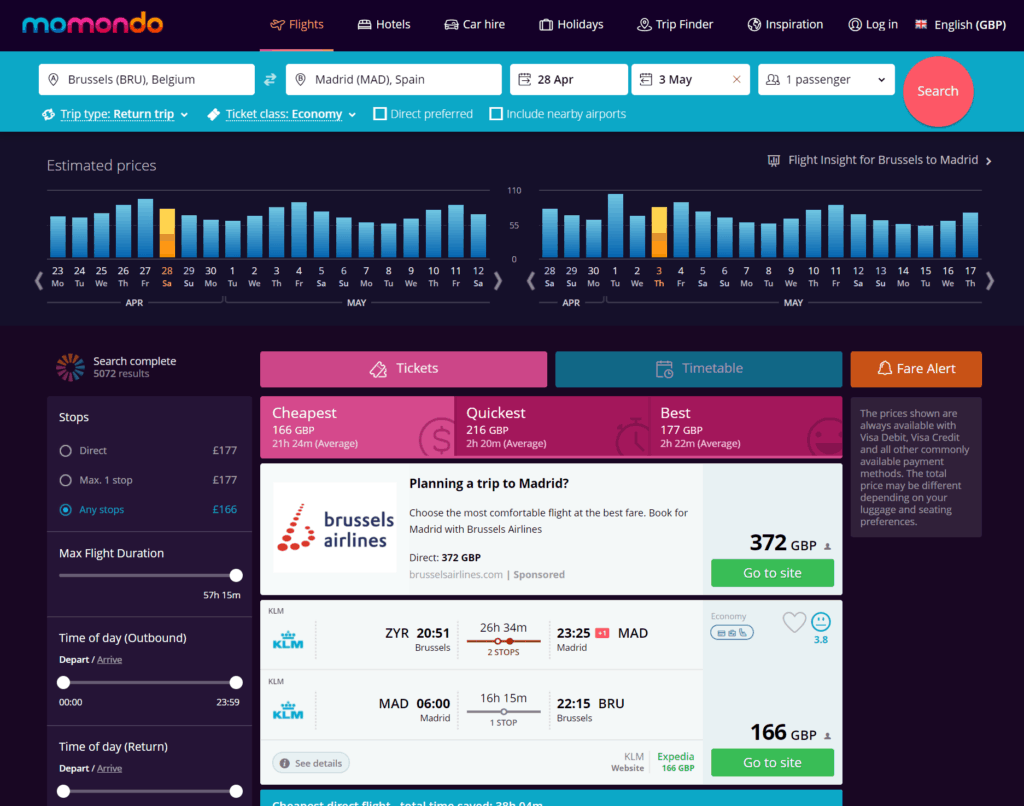
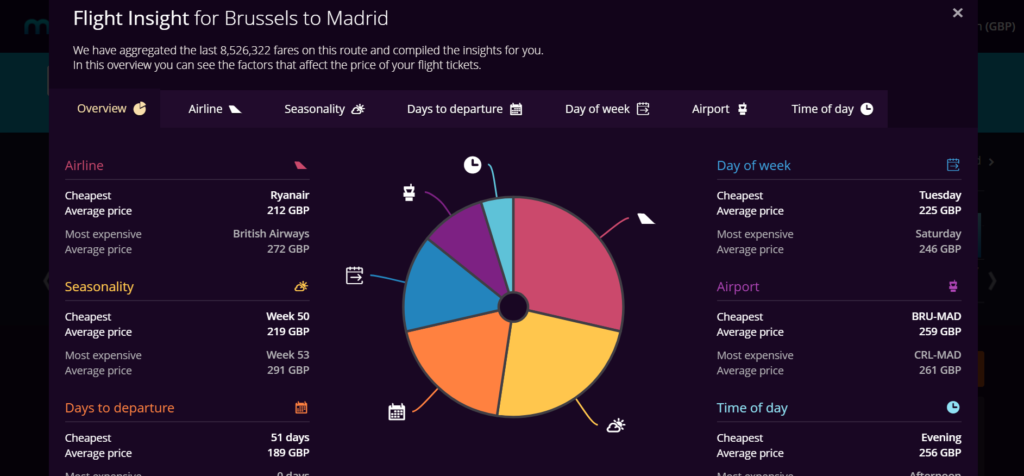
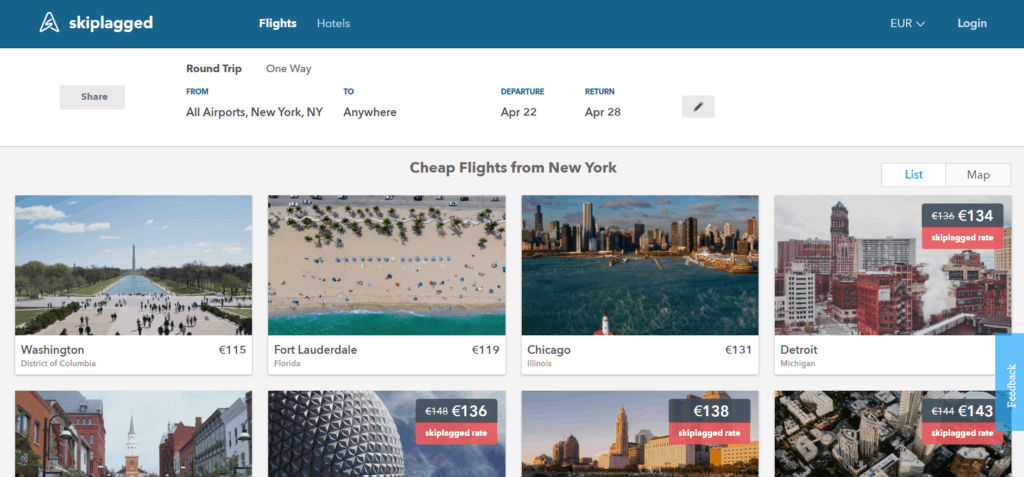
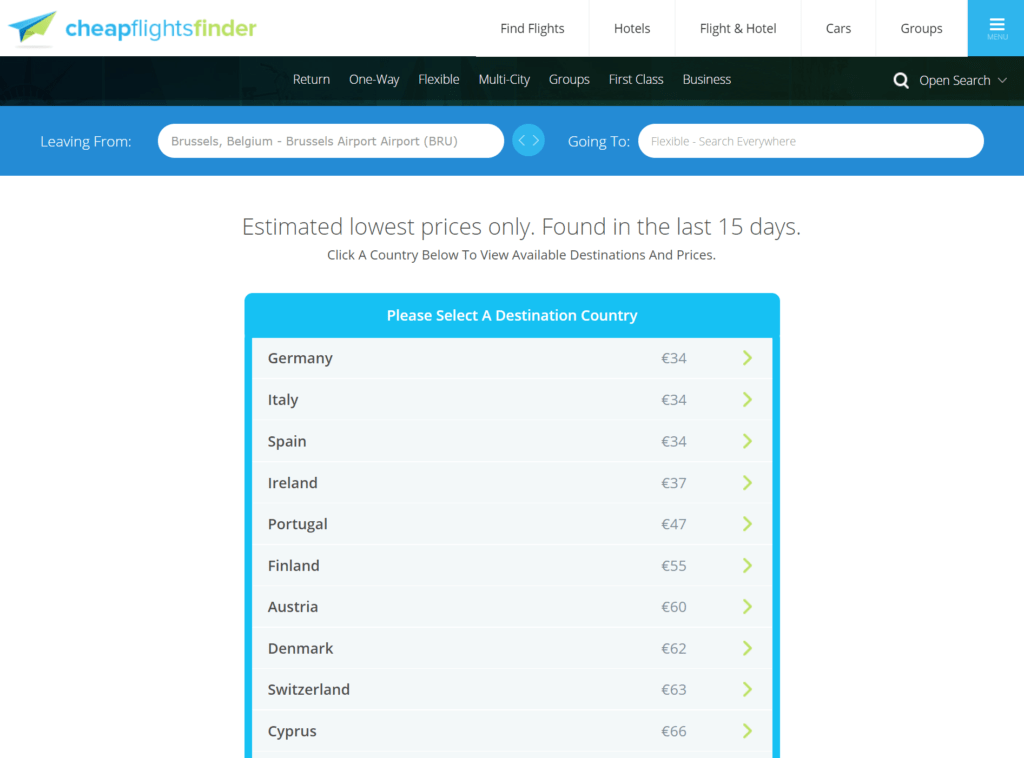
Of course, there are other ways to find cheap flights than to scour metasearch engines in search of the best deals. Here are some more tips.
Being one of the busiest industries in the world, the travel sector is bound to make some mistakes. These mistakes don’t always mean that your flight gets delayed or cancelled. In fact, you might even get a cheaper flight out of them.
An error fare is a flight for which incorrect information was entered into the system. For example, an employee can forget to take fuel costs into account, use an incorrect currency or forget a zero at the end of the price tag. In other words, error fares always come from human mistakes.
There are some things you should keep in mind when you’re considering booking an error fare.
If you’ve considered all of the above, and you still want to find error fares, go for it. In that case, here are some websites that often post about error fares. I recommend subscribing to their mailing lists to make sure that you never miss one. (Cheap Flights Lab, Secret Flying, Fly4Free, Airfare Watchdog)
This is arguably the most famous trick for people trying to find cheap flights. If you’re browsing through airline websites or metasearch engines, make sure you do it in incognito mode. (Control/Command + Shift + N on Google Chrome, Control/Command + Shift + P on Firefox, Command + Shift + N on Safari)
You’ve probably been there. You’re looking for a flight to your dream destination, and you check some websites every day. However, after two or three days, you find out that the prices are going up.
“Well, yes, but how can an incognito window help me with this?”
These websites use files called cookies against you. They know your browsing history, and when they see that you repeatedly look at the same flights, they will increase their prices. This way, they make it seem like seats are selling out and you should book sooner rather than later if you still want to be on the plane. In reality, this is not happening.
If you use an incognito window – which doesn’t track cookies – you’ll see that the price stays exactly the same. You can also use this technique to buy other products online.
It’s only logical that budget carriers offer cheaper prices than other airlines. They save money in various ways, including limited or no onboard luxury features, multifunctional staff, in-flight service and flying to alternative airports.
Some of the biggest budget carriers include Ryanair, EasyJet, Southwest Airlines, Vueling and Norwegian Air.
I’ve already mentioned joining mailing lists as a way to find cheap flights before, but here it is again. Just because it really is one of the best ways to find great deals on plane tickets.
Mailing lists often include results that can’t be found on the metasearch engines I mentioned above or on the airline’s websites. You’ll receive emails whenever flights are really cheap or when a particular flight has dropped in price. In some cases, you can even select your favourite airport(s) and only get updates about flights from there.
Some good places to start are Scott’s Cheap Flights, Airfare Watchdog, The Flight Deal and HolidayPirates.
After signing up for frequent flyer programmes, you can track and save miles and use those miles to pay for your next flight. This is a great way to save big on flights and even get to fly for free. Nowadays, most airlines have a frequent flyer programme, and some of them even team up, so that you get to spend your miles at different airlines.
The biggest frequent flyer programme in Europe is Miles & More, launched by Lufthansa in 1993 and used by twelve European airlines. This programme allows you to save miles for flights with all Star Alliance members.
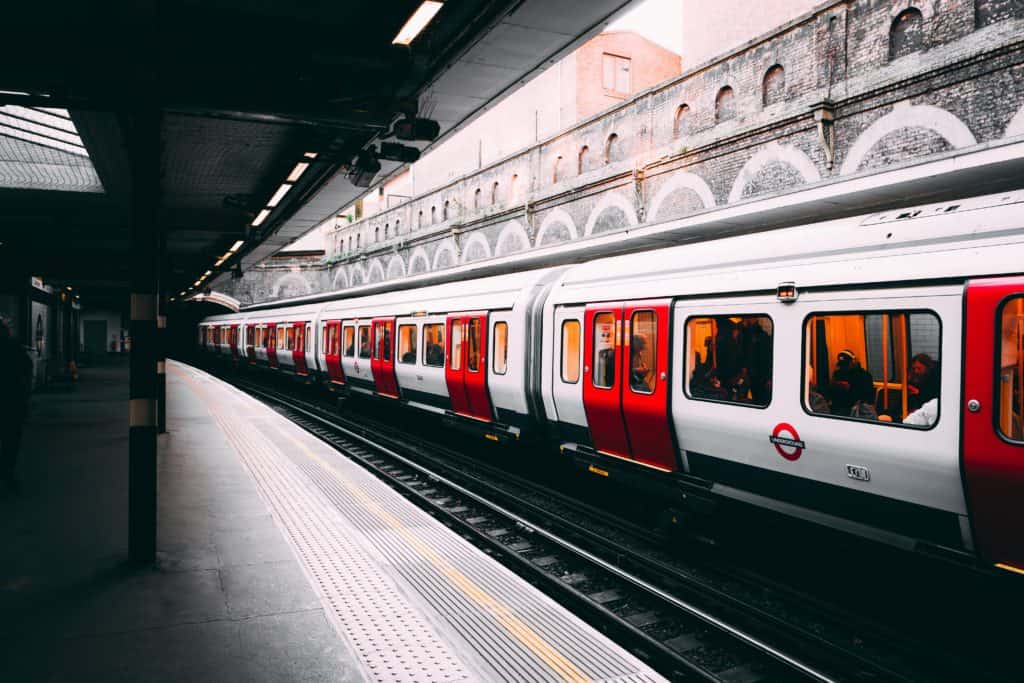
Especially in Europe, both trains and buses are popular options for long-haul travel. Because of that, there are many websites and companies dedicated to transporting Europeans, and more competition means cheaper prices. Yay!
The Man in Seat 61 has a very extensive website filled with information about train travel all around the world. His website even includes information about which trains to take in North Korea and how to plan a trip on the Trans-Siberian Railway.
Some things you should keep in mind when looking for cheap train tickets:
If a cheap bus ticket is what you’re after, there are plenty of options. Especially in Europe, many companies offer bus rides that are sometimes even cheaper than flights (although it will take you longer to arrive at your destination).
Some great European bus companies are FlixBus (all through Europe), Avanzabus (in Spain), MeinFernbus (mostly Germany), Ouibus (mostly France, Italy and Spain) and Alsa (mostly Spain and Portugal).
There are also meta search engines for bus tickets, including Wanderu, Comparabus and Busradar.
Even if you’re travelling with other people, rental cars tend to be more expensive than public transport. Of course, they do offer more flexibility. As a solo traveller, you can still find alternatives for rental cars that are cheaper and more flexible.
If you didn’t know, BlaBlaCar is a long distance carpooling service that allows drivers to ‘sell’ spots in their car to travellers on a budget. On the website, you can enter where your trip starts and ends and when it’s going to happen. With any luck, you’ll find a driver who’s going to take you there.
Of course, the trips from bigger cities will have more options.
You’ll not only get a cheap drive down to your destination (without having to do anything!), you might also have some great conversations and even make a few new friends. If you’re not a big talker, you’ve still got nothing to worry about. Most drivers are completely fine with silence or putting some music on.
Photo by rawpixel.com on Unsplash
Hitchhiking is basically a free alternative to the BlaBlaCar system, without any guarantees that you’ll actually get a ride. If you don’t mind risking the possibility that you may have to wait for hours until somebody picks you up, hitchhiking can be a great way to get around.
However, hitchhiking isn’t safe – or even legal – everywhere. Here are some tips to make sure that you have a safe hitchhiking experience:
If you don’t feel comfortable sharing a car with somebody you don’t know, you could still rent a car. However, if you do, take a look at some package deals. Some websites (like Expedia, Kayak, Booking, Travelocity and Orbitz) offer deals if you book your flight and your rental car with them. That may lead to some small savings.
Note: this (obviously) only works if you haven’t booked your flight yet.
Everyone knows that transport prices, and flight prices in particular, change. They change often, they change quickly and they change quite dramatically. However, if you understand how the system works, you can try to get around it.
There’s a general rule of thumb that says that you should book your flights (or other transport, for that matter) in advance. For flights, this seems to be somewhere between 25 and 150 days before takeoff. Some people say it’s between 45 and 60 days before the flight, some say it’s exactly 54 days before. However, as long as you avoid the “Early bookers” and “Last minute bookers” windows, you should be fine.

Photo courtesy of cheapair.com
There are three main age groups that can benefit from discounts: children, students and seniors.
People who are travelling with children may not be reading this, but I’ll throw this tip out there just in case. Children often get reduced entry fees at museums, theatres, tours, etc. It would be foolish not to use these discounts if you’re travelling with kids.
As a student, you’re more likely than anyone not to be able to spend a lot of money on travel. You can counter this problem by using the various student discounts that are available all over the world. Just be sure to take a valid student ID card with you (sometimes, even a document that looks like a legit student ID is enough) and you’re good to go.
There is often some kind of discount available for senior citizens as well. These discounts start at ages as early as 50 years old. There are cheaper tariffs available for public transport, nature reserves, airlines, cathedrals, and much more.
Although taking an overnight bus, train, flight or boat may be a bit more expensive than its daytime equivalent, you won’t have to pay for accommodation. In most cases, that’s still a pretty good deal and a great way to save some money on the road.
You’re going to have to sacrifice your quality of sleep for one night, but that’s nothing compared to the money you’ll save. Just be sure to bring an eye mask, earplugs and a neck pillow.
Well, that was it. You can also read about how to get cheap accommodation as a solo traveller and how to find cheap food and drinks as a solo traveller or you can download my free ebook on cheap solo travel.
Do you have any cheap transport tips for solo travellers that I missed? Let me know in a comment!
Thanks for reading!
-S
PIN IT!
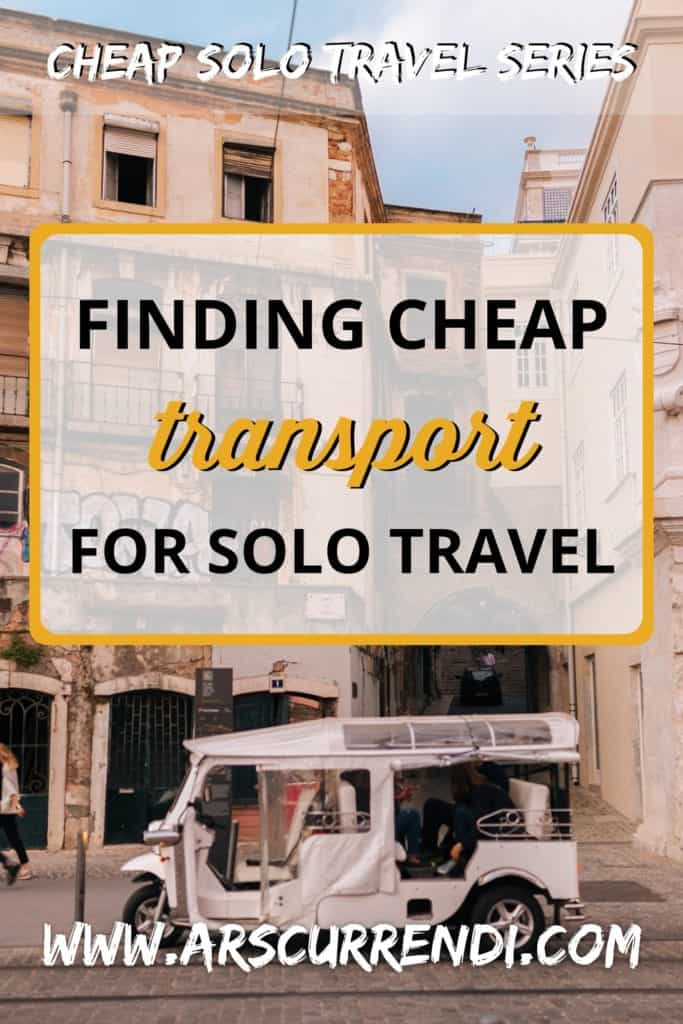
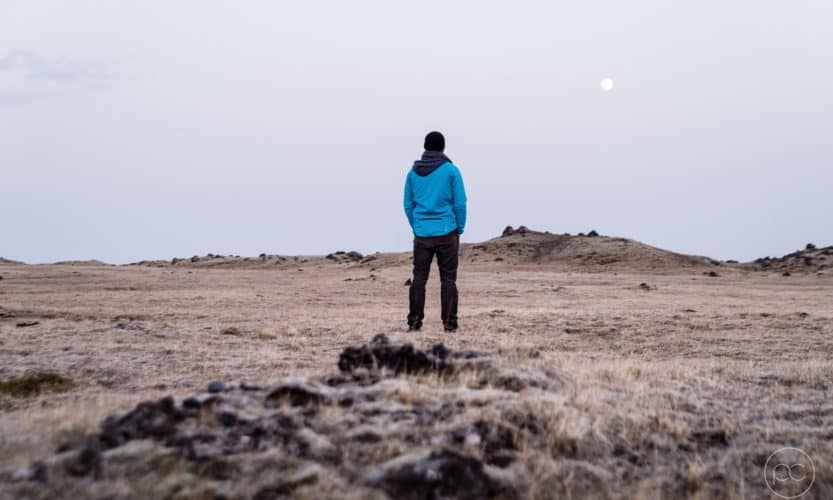
Finding cheap accommodation is a key part of saving money when travelling solo. Accommodation is one of the most expensive aspects of solo travel, but you can save some money using these tips.
Latest update: 2 July 2019
Note: this blog post uses insights from my free ebook “The Insider’s Guide to Solo Travel on a Budget“.
Disclaimer: this post may contain affiliate links, meaning that, at no extra cost to you, I will make a small amount of money if you purchase something through one of these links. Thanks for supporting Ars Currendi!

This is my first blog post in a series of posts about cheap solo travel. The second post focuses on cheap transport and the third post focuses on cheap food and drink.
I decided to create this series to help you travel by yourself and have the time of your life for less money, using tips and insights I’ve gained on my solo trips and telling you things I wish I had known when I started travelling alone.
There are too many people that still don’t sleep anywhere else than in a hotel when they travel. I want to change that. It’s easy to find a place to sleep that is not only cheaper, but also charming and entertaining.
Nowadays, most hostels and other cheap solutions have the same features as hotels, if not even more. If you are able to save money on your accommodation, that means you can splurge on other parts of your trip. In other words, cheap accommodation will help you have the holiday of your life, without having you worried about spending too much. Isn’t that what we’re all looking for in the end?
Tourists and travellers often don’t want to spend the time trying to find a cheap place to sleep, and they end up paying too much for their accommodation. I can assure you that it’s worth it to take some time and research cheap accommodation options so that you find one you’re happy with.
There are many ways to save money on the road. One of those is to choose a cheaper alternative for the ever-popular hotel, which can run down your budget rather quickly. Here, I’ll list some options.
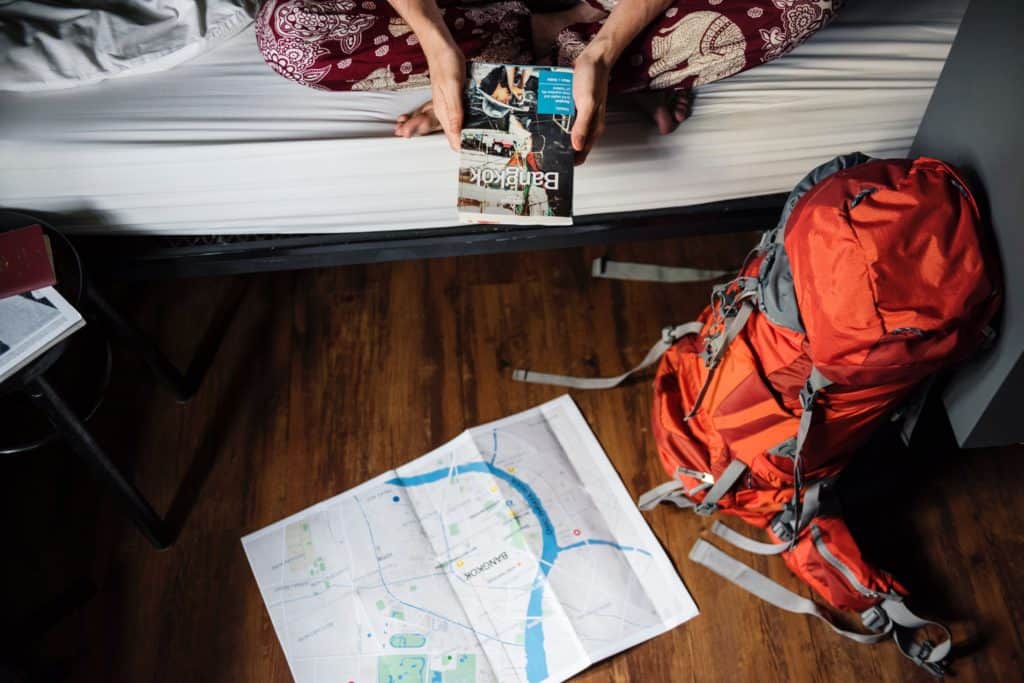
For budget solo travellers, hostels seem to be the most popular accommodation choice. There are a number of very good reasons why hostels are so popular.
First off, though, some explanation as to what a hostel actually is, in case you didn’t know. A hostel is a type of accommodation mainly aimed at young travellers (18-30 years old). The cheapest, most common option in a hostel is a bunk bed in a mixed dorm room. That means that you’ll be sharing your bedroom, bathroom and kitchen with strangers. It can seem daunting, but you get to spend time with some cool people and even make new friends!
Hostels have different sizes of dorm rooms (the bigger the room, the cheaper the bed). Most hostels even have private rooms if you’re not comfortable sharing a room with people you don’t know. These private rooms are usually more expensive than a bed in a dorm room, but still cheaper than hotels.
Nowadays, there are still many people who believe hostels are dirty, unreliable places and they don’t want to spend any time there. However, in reality, most hostels are as clean and trustworthy as any hotel (and they’re cheaper!)
My favourite website to book hostels is Hostelworld.
If you’re familiar with vacation rentals, you’ve probably heard of Airbnb. Just in case you haven’t: Airbnb is a website where people can rent their apartments, rooms or even separate beds for a short amount of time.
Tip: if you’re new to Airbnb, sign up through this link and you’ll receive €35/$43/£31 worth of travel credit!
Airbnb prices are usually something like a fancy hostel or a cheap hotel. That makes it a great option if you’re travelling with your SO, with friends or with family. However, you can still find great deals as a solo traveller. For example, I found a bed in a shared room in Malta for €20 a night. The people hosting this room were renting out separate beds in their own house, while they lived there as well. They managed to create an international hostel, right in their own house. Those people ended up being one of the best parts of my trip to Malta.
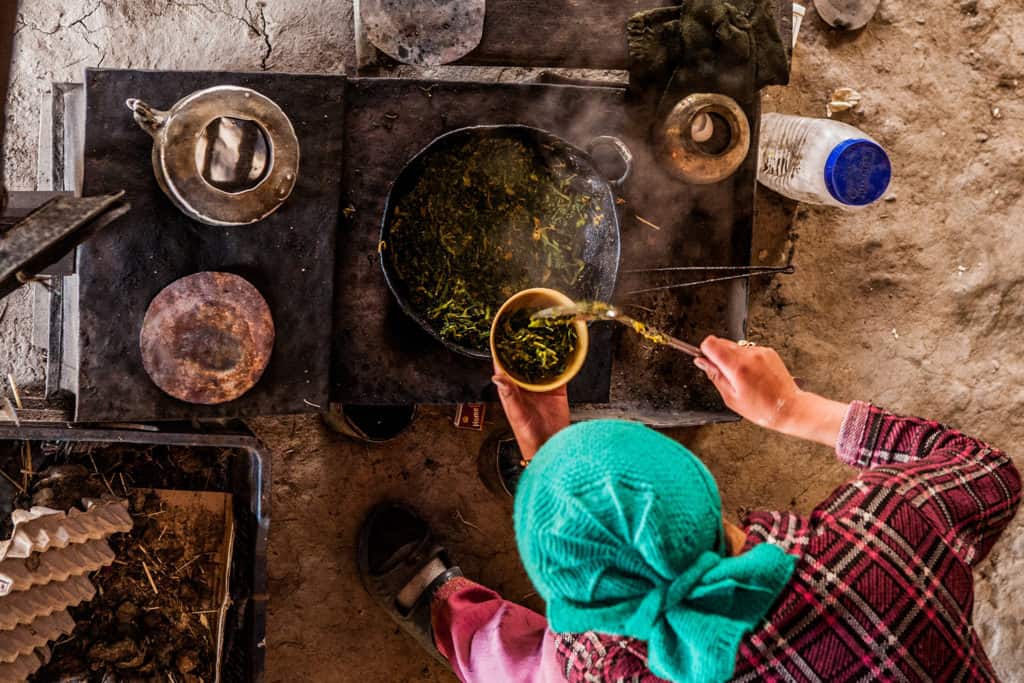
Couchsurfing is a “service that connects members to a global community of travelers”. At least, that’s what they define themselves as on their website.
In short, that means that you’re staying with somebody without paying rent. It’s free. The catch? You’re sleeping in somebody’s home, and you might not get along with them.
If you’re thinking “that’s a small catch for free accommodation!”, you’re absolutely right and I agree with you 100%. If you’re couchsurfing, you get to stay with somebody who knows the ins and outs of your destination. You can talk to them and you can become friends if you have a lot in common. They might even show you around and take you to the places only insiders know about.
Of course, there’s always the concern of safety in situations like these. However, the company takes many measures to ensure that their travellers (solo travellers in particular) are safe. Most CS hosts were first-time surfers at one point, and they started hosting to give back to the community (read: you). They’ll try their very hardest to make you feel safe and at home while you’re there.
The website also has safety precautions. For example, you can check if your potential host has a picture attached to their profile and if they have confirmed government documents. The reference system is probably the best guideline for a safe host: if they have positive reviews from other surfers, it’s almost sure that you’ll be safe and have a good time as well.
There’s only one thing better than cheap accommodation, and it’s free accommodation.
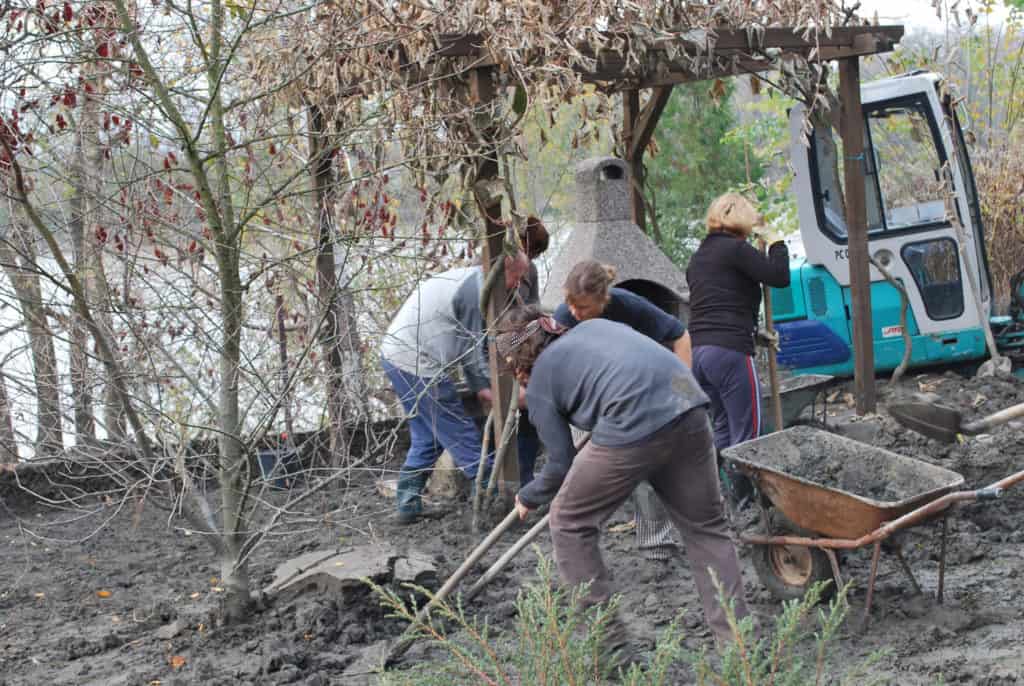
The next option for cheap accommodation (free, technically) is volunteering. This has become increasingly popular over the last years, especially with young solo travellers.
Note: this is not about volunteering for an organisation and paying for it. This is about spending time abroad and helping out a local community in exchange for (food and) a place to sleep.
Some great websites to find a volunteering job abroad are WorkAway, WWOOF, AuPairWorld and FindAuPair.
Websites like WorkAway and WWOOF introduce possibilities for travellers to work for a host and they reward you with free accommodation. These hosts include farms, schools, NGOs and other local projects. This means that you’ll really be submerged in a foreign culture, so it’s a great way to find out more about the rest of the world. There are often short-term positions available.
Working as an au pair means that you’re essentially a nanny. It’s usually much more of a commitment than the aforementioned possibilities. An au pair is usually a young person (between 18 and 30) who lives with a host family for a certain amount of time and cares for the children. The biggest difference is that you actually get paid as an au pair (minimum monthly wages range between $100 and $500) on top of getting free accommodation.
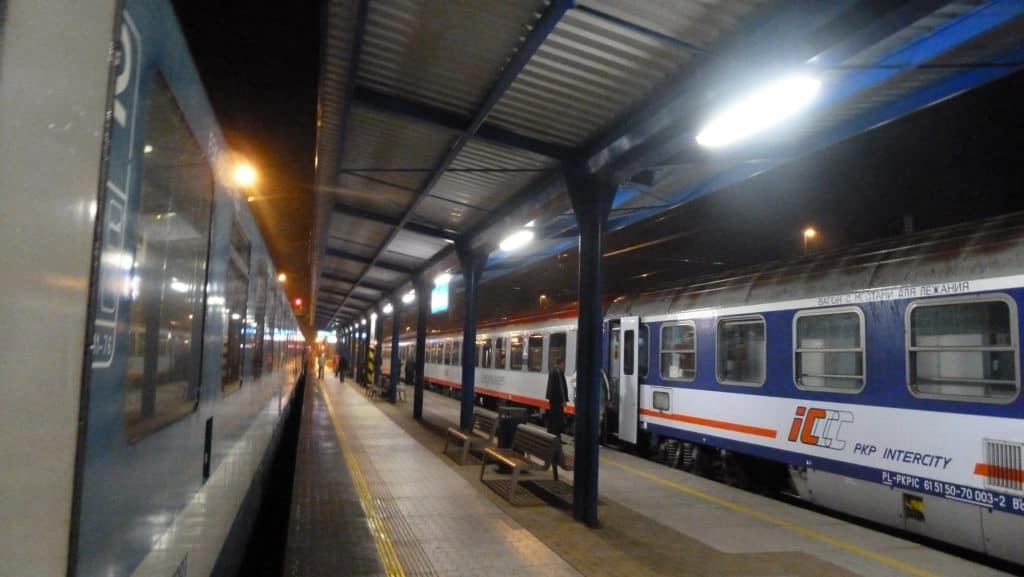
Okay, yes. An overnight bus, train, boat or flight might be a bit more expensive than its equivalent in the daytime. However, you’re essentially getting a place to sleep for free. And while it might not be the most comfortable, you’re getting cheap accommodation, aren’t you?
With an eye mask, earplugs and a neck pillow, your quality of sleep might not be so bad. More importantly, you’re saving quite some money on your accommodation budget. That’s money that you get to spend elsewhere!

House sitting is on the rise. And even if you’ve never actually done it, you probably know of someone who has. Think about it. If somebody leaves for two weeks to go on holiday and they don’t want to leave their house, pets and plants alone, they ask someone to look after that. If you’re lucky, you might get to do that in exchange for free accommodation!
The thing is, the market for house sitters is rather saturated and there’s a lot of competition. There are way more hosts than sitters. One way you can get ahead of others is to join a house-sitting Facebook group like House Sitting Cafe or House Sitting World.
There are also websites dedicated to helping hosts find someone to take care of their house while they’re gone, such as TrustedHousesitters, Nomador, House Sitting World and HouseSitMatch.
If you’re a seasoned solo traveller, you know the toughest part of finding cheap accommodation is avoiding the single supplement. In case you’re not so seasoned, here’s what that means.
Hotels, cruises and other similar organisations charge solo travellers with a solo supplement. That’s a premium that is charged to them because they’re taking up a room that could be used by two people. This supplement can take up between 10% and 100% of the original price.
There are some ways to avoid the single supplement, though. And I’m here to teach them to you.
The best way to guarantee that you won’t be charged with a single supplement is to, well, make sure that you’re not single anymore. You can find like-minded travellers all over the place. That’s especially true when you’re staying in hostels or taking a group tour.
Related: Making friends as a solo traveller
If you find somebody you really like, you can ask them to become your roommate. That way, you’ll both save money and you might even make a new friend.
Can’t find a buddy to bunk up with? No worries. There are still other ways to eliminate or reduce your single supplement.
For example, you can use your diplomatic skills, talk to the operator/vendor and try to convince them to waive the supplement. You can do this in real life, over email, through Twitter, by calling the operator, …
Chances of this working are admittedly slim, but that doesn’t mean you can’t try. After all, you’ve got nothing to lose.
In the shoulder season, low season or off-season, tours and rooms are less likely to be fully booked. That means that operators might be more desperate to fill up their empty spots, and be more likely to waive the supplement if you ask.
Travel agents know the ins and outs of the travel business. They know of even more ways to benefit solo travellers. One of those ways is getting cheaper rates by getting rid of the single supplement. Travel agents are paid to help their clients get the cheapest rates, and you should definitely use that expertise to your advantage.
Now, you should definitely be able to find cheap accommodation easily. After reading this blog post, you’ll never overpay for a hotel room again. In the next chapter of this miniseries, I’ll teach you how to find cheap transport (including cheap flights!). The third post will focus on cheap food and drinks.
Better yet, you can grab your free copy of my ebook on cheap solo travel and get even more tips to cut down your costs as a solo traveller.
Share this article if you learned something!
Thanks for reading!
-S
PIN IT!




I can hear you think it. “Another travel bucket list? What is going on here?” Trust me, you won’t regret reading this. This one is different. As opposed to the last travel bucket list I posted, this one won’t list (a lot of) specific destinations. Instead, you’ll find a series of special adventurous activities. You might even get some inspiration or find some cool travel ideas here. So grab a drink, settle down and enjoy the show.
One of the things I try my very best to pursue while I’m on the road is chasing adventure and doing unique things. Basically, I try to take the path less traveled. On my quest to find this, I’ve come across a number of adventurous activities I have never experienced. I fully intend to one day get to doing them, and I will keep you updated when I do. Until then, let me tell you about them!

For starters, I’d like to share some thoughts on the concept of fear. Some things in life are terrifying. But being afraid of those things is a sign you’re doing the right thing. I’m absolutely frightened at the thought of doing some of these things.
What if the rope snaps? What if my parachute won’t open?
After some pondering about the answers to these questions, I started realizing that I shouldn’t even be worried about it. The sole fact that I’m scared beyond myself of doing things tells me that it’s going to be worth it.
I’m not afraid of knitting scarfs. Nor have I really gotten any real satisfaction out of knitting a scarf, no matter how beautiful it was (yes, I actually have done this before).
I was afraid of traveling alone. After going to Dublin without anyone else, I wasn’t anymore. Not everything went the way I had planned it, and that’s okay. Even better: I was proud of what I had done and I couldn’t wait to tell people about my experience.
Now that we’ve got that out of the way, let’s take a look at some exciting, terrifying adventure activities.

Credit: David Ramos (Getty Images)
La Tomatina is a yearly event in the city of Buñol (Spain). On the last Wednesday of August, people come from all corners of Earth to get together for one of the world’s biggest hour-long food fights and throw tomatoes at each other. The festivity in itself doesn’t have any purpose except entertainment.

Credit: Sandid (Pixabay)
It just seems incredible to be able to feel the way a bird would experience the world. No worries, no boundaries… Only freedom. Of course, this is not something to recommend to someone suffering from severe fear of heights.

Credit: WaltiGoehner (Pexels)
Again, not really an activity for those vertigo people. If you’re not one of those people, though, you might be like me. I want to try all kinds of cool things, like bungee jumping. I’m sure that once I’ve tried it, I’ll want to go more and more extreme. Oh well, we’ll see what the future brings.

I actually found out about this hiking trail after looking online for travel inspiration. I stumbled upon an article by Bored Panda about the Mt Huashan plank walk and I decided that I wanted to do this some day. It looks like you can’t feel more alive than when you’re hiking there. I can’t wait.

Credit: Skeeze (Pixabay)
When one of my best friends got a skydiving voucher as a birthday gift, he was hyping me up all day, every day. A couple of weeks later, he actually did get to it, and now he’s looking into getting his own permit to do it without someone else going with him. That must mean that it was fun. Probably even a bit more than just ‘fun’. Which is why I intend to do this as well. (If I wait a couple of years, he might be able to take me with him).

Does this picture really even need an explanation as to why I want to go here?
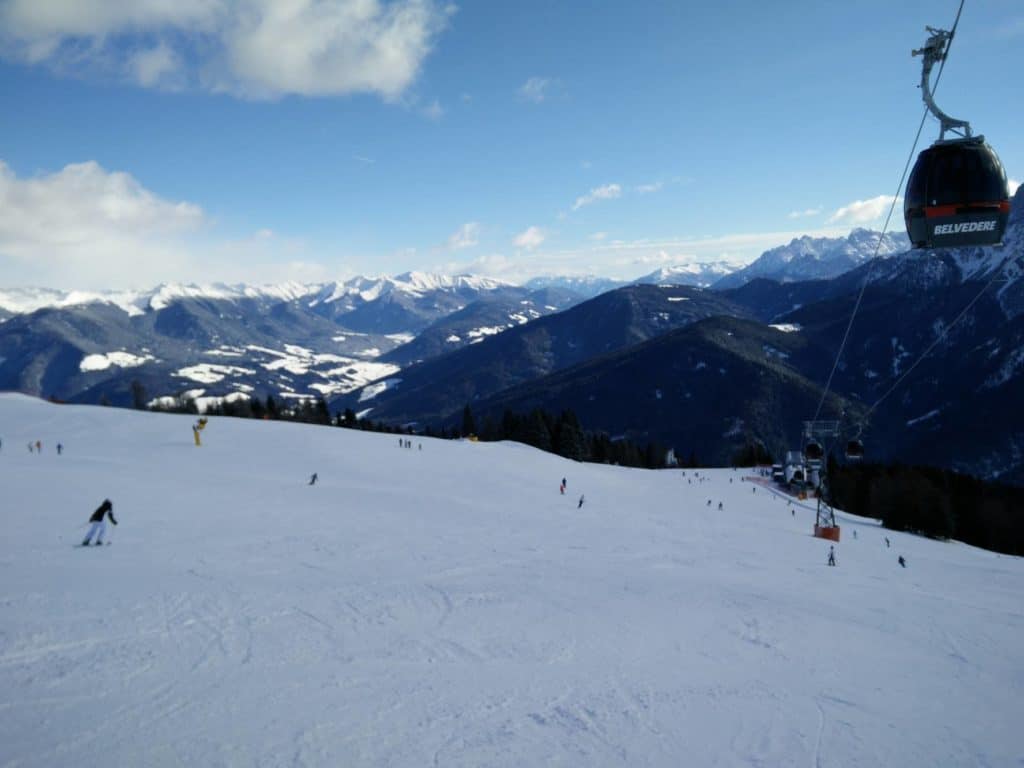
I mean, how could anyone not like this?
This one is a little bit different than the others, because I’ve already gone skiing. A couple of times. It feels amazing to glide down the ski slope along with people you don’t know. Hearing the snow crack beneath your feet is something you can’t explain, but you have to experience. That being said, I wouldn’t mind if this was something I could continue doing for a long time to come.
So, there we have it. These are the most adventurous, thrilling things I want to do and continue doing in the future. Do you have any adventurous activities to add to this? Any comments on my choices? Let me know!
Thanks for reading!
-S
Design by NXNW.